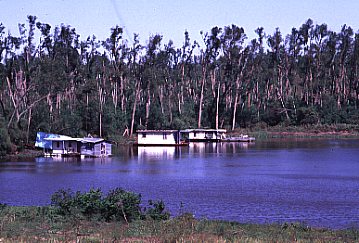

"There is silence, and a sense of mystery,
in the cypress swamp".LOUISIANA BAYOUS
It is a place that seems often unable to make up its mind whether it will be earth or water, and so it compromises.
The result is that the bayous belonged to neither element. The bayous have shaped the life and the history of their people, setting the design within which they moved, made their living, and enjoyed their world.
The story of the Acadians is one of a phenomenal people, of a tenacity and determination that are unspectacular but nevertheless fervent.
They came to the area as refugees. It was planned that they should be widely separated, dispersed among the American colonies.
But they would not be broken. Many died, but those who lived held fast to their hopes and to their possessions.
Few thought of far-off Louisiana when they were taken from Nova Scotia. A few came by chance, and it was the first place to which they were welcomed.
Here was the opportunity for which the Acadians had prayed. They were a quiet, rural people, who wanted largely to be left alone.
They had suffered, their families torn apart by hostile outside forces. That must never happen again!
They found themselves in a locale remote from other colonies, and they rejoiced. The world heard little and saw nothing of the Acadian and his bayous. He remained in the back country, developing his own habits, his own economy, his likes and dislikes.
His contact with others were few, he lived on his own resources. He acquired, with the years, not possessions but peace.
The Acadians worked and played as in times gone by, behind the protective barrier of bayou and distance. Others would have accepted this territory only as a place of temporary refuge; the Acadians took it for home.
PIERRE ARSENAULT
Pierre Louie Arsenault was born in Beaubassin, Acadie in 1731, son of Jean and Anne-Marie Hebert.
He married Anne Bergeron about 1758 and had 5 sons and 3 daughters.
Pierre first settled in St. James on the Mississippi (according to the 1766 census) then moved to establish his ranch in the Attakapas Districk, in the present day Carencro. He owned extensive buildings, 400 head of cattle, 15 horses and 16 slaves, and a total worth of $5,530.00 in currency which is 10 times today,s total value of the U.S. dollar.
He died in 1793, his last will was discovered a few years ago in the Court House achives at St. Martinsville, Louisiana.
SOURCES: Dr. Thomas J. Arceneaux, Dean of the Faculty of Agriculture of the University of Southwestern Louisiana. had been, over a period of many years, one of the most fervent of collaborators of the author in the research of documentation pertaining to the history of the early Louisiana Acadians. The discoveries of Pierre Arceneaux's will and testament are due to his co-operation.
Please click here to open my third page